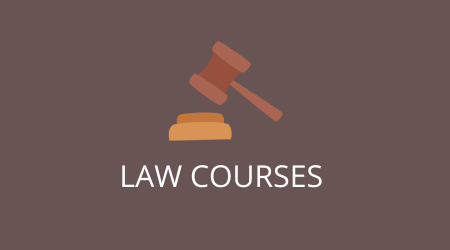Law Courses In India, Candidate can pursue a Law course right after passing 12 classes. Law courses offer a wide range of choices, integrated undergraduate degrees like B.A. LL.B., B.Sc. LL.B., and B.Com LL.B. including the Bachelor of Laws (LLB) degree. Integrated Law Course takes 5 years to complete and LLB generally takes three years. The law course covers the topics of legal principles and provides a foundational understanding of the legal system. Additionally, specialized undergraduate programs, such as BBA LLB, BSc LLB, or BCom LLB, followed by an LLM and PhD in Law, are also popular. These courses in law cover a wide variety of subjects, including constitutional law, criminal law, corporate law, environmental law, and more.
Also Check :- Our Latest Post and Govt Updates
Admission in Law courses is offered through an entrance test for UG and PG. The CLAT is the most popular national-level law entrance exam, followed by AILET, LSAT, SLAT and similar other tests organized for different institutes and states.

Stay Updated With Us and Join Now.
| Join Our Whatsapp Group | Click Here |
| Join Our Telegram Channel | Click Here |
The CLAT entrance exam provides admission to both undergraduate and postgraduate programs at 22 National Law Universities in India. On the other hand, AILET is designed for those interested in pursuing five-year integrated LLB, one-year LLM, and doctoral programs offered by NLU Delhi.
In addition to national-level tests, there are also state-level exams such as AP LAWCET, MH CET LAW, TS LAWCET, and others which serve as a means for admission to colleges within specific states. Furthermore, certain institutes, including Delhi University, Panjab University, BHU, AMU, and others, conduct their own entrance exams for their respective law programs.
Law Courses Eligibility
Every university both private and public universities offer admission to Law colleges across India and have a different selection process and eligibility criteria for admissions in UG, PG certificate, and diploma courses.
UG Courses- It’s an integrated course which is of five years and must have Higher Secondary School/Intermediate (10+2) or its equivalent exam from a recognized board with a minimum of 45% marks in aggregate.
PG Law: It is a three years course after graduation. For getting admission to LLB for three years you need to be graduate from a recognized university.
LLM Course- For admission in this course you have to possess an LLB degree or its equivalent degree.
Certificate or diploma Law Courses: you can get admission in certificate after 12 with a minimum of 45 per cent marks in 12 standard.
Popular courses-:
BA LLB
BBA LLB
BSC LLB
B.Com LLB
LLM
PhD
LLB,
LLB (Hons),
LLB IPR
Bachelor Legislative Law
Bachelor of Law (Hons)
B.Tech LLB
BSL LLB (Bachelor of Socio-Legal Sciences plus Bachelor of Law).
PG courses
Master of Business Laws Programme (MBL) [Two Years]
Post Graduate Diploma Programmes [One Year]:
a) Human Rights Law (PGDHRL)
b) Medical Law & Ethics (PGDMLE)
c) Environmental Law (PGDEL)
d) Intellectual Property Rights Law (PGDIPRL)
e) Child Rights Law (PGDCRL)
f) Consumer Law & Practice (PGDCLP)
g) Cyber Law & Cyber Forensics (PGDCLCF)
LLM International Trade Law
LLM (Hons)
LLM Criminal Law and Criminology
LLM (Mercantile Law)
LLM (Corporate & Securities Law)
LLM Labour Law and Administrative Law
MA Business Law
Master of Cyber Laws and Information Technology
LLM (Energy Law)
M.Sc IPR
MA Public Policy Law and Governance
MA Criminology and Criminal Justice
LLM (International Law, Constitutional Law, and Human Rights)
MA Human Rights
MA Anti-Terrorism Law
MA Criminal Justice
Certificate course
Certificate on Cyber Laws
Cyber Law Expert
Certificate Course in Consumer Protection
Certificate Course in Corporate Law
Certificate Course in Insurance Law
Certificate Course in Business Law
Certificate Course in Anti–Human Trafficking
Certificate course in Human Rights
Diploma Course
Diploma in Business Law
Diploma in Criminal Law
Diploma in Taxation Law
Diploma in Corporate Law & Management
Diploma in Women Studies & Gender Justice
Diploma in International Law
Diploma in Labour Laws and Labour Welfare
Diploma in Labour Laws
Diploma in Information Technology Laws
Diploma in Human Rights
Diploma in Criminology
Diploma in Cyber Law
Diploma in Co-operative Law
